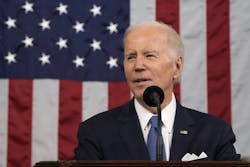USDOT Announces $130 Million for Seven Tribal Land Transportation Projects
The U.S. Department of Transportation’s Federal Highway Administration (FHWA) announced Thursday that $130 million in federal grants will be awarded to seven projects under FHWA’s Nationally Significant Federal Lands and Tribal Transportation Projects Program.
The grants, announced at an event at the Grand Canyon National Park, recognize transportation projects that serve Federal and Tribal lands. They are part of President Biden’s Investing in America agenda to grow the American economy and rebuild our nation’s infrastructure.
The FHWA also announced applications are open for the next round of funding through this program.
“Under President Biden’s leadership, we are delivering infrastructure improvements on Federal and Tribal lands that communities have needed for decades,” said U.S. Transportation Secretary Pete Buttigieg. “With today’s announcement, we’re making it easier for Americans to access some of our greatest natural wonders, and improving road safety in Tribal communities, which face some of the highest rates of traffic deaths in the nation.”
“FHWA is proud to award these grants that will help make travel safer and provide more enjoyable access to key destinations that support local residents, business and visitors,” said Federal Highway Administrator Shailen Bhatt. “From the Grand Canyon in Arizona to Chincoteague National Wildlife Refuge in Virginia, these projects will help address the climate crisis and make a huge difference in the safety and quality of life for surrounding communities and hundreds of thousands of visitors to our nation’s Federal parks and wildlife refuges.”
The grant recipients announced today are as follows:
- The National Park Service will receive $27,500,000 million for the Grand Canyon National Park Shuttle Bus Fleet Replacement project in Arizona. The project includes the purchase of 30 new buses, including 10 new battery electric buses and 20 new compressed natural gas (CNG) buses to replace the current fleet and installation of charging infrastructure.
- The North Carolina DOT will receive $21,400,000 million to construct the Ecusta Rail Trail between the City of Hendersonville and the City of Brevard, which will connect the statewide bike route system with Pisgah National Forest and the Blue Ridge Parkway near Asheville.
- The U.S. Fish and Wildlife Service will receive $17,700,000 million to begin improvements of Multimodal Beach Access at Chincoteague National Wildlife Refuge in Virginia. The award will initiate the first phase of a larger project in partnership with the National Park Service and Assateague Island National Seashore. Construction will include a new access road, a multiuse path and portions of new parking lots and other beach facilities.
- The county of Tooele, Utah, will receive $8,300,000 million for the Ibapah Road Safety and Rehabilitation Project in Utah. The project will provide essential mobility and safety improvements along 35 miles of a rural highway that is the principal route connecting the Confederated Tribes of Goshute Reservation with goods, services and schools in Utah and Nevada.
- The Confederated Salish and Kootenai Tribes in Montana will receive $30,500,000 million to fund the first phase of the U.S. 93 roadway improvement project from Dublin Gulch to Gunlock Road, including a new multi-span bridge over Ninepipes Reservoir. The project will provide necessary safety improvements to U.S. 93.
- The Pyramid Lake Paiute Tribe in Nevada will receive $11,900,000 million for construction of the Wadsworth Bypass Road (Indian Route 35), a new road that will help convey highway traffic away from residential areas within the community of Wadsworth. The project will improve travel conditions and access to Interstate 80.
- The Cherokee Nation in Oklahoma will receive $12,900,000 million for the Cherokee Nation Mud Valley Road Reconstruction project, which will make improvements to the road within the Cherokee Nation Reservation, including adding shoulders, replacing three bridges and improving the line of sight at an existing intersection by constructing safety countermeasures.
-------------------------------------------------------------
Source: U.S. Department of Transportation
